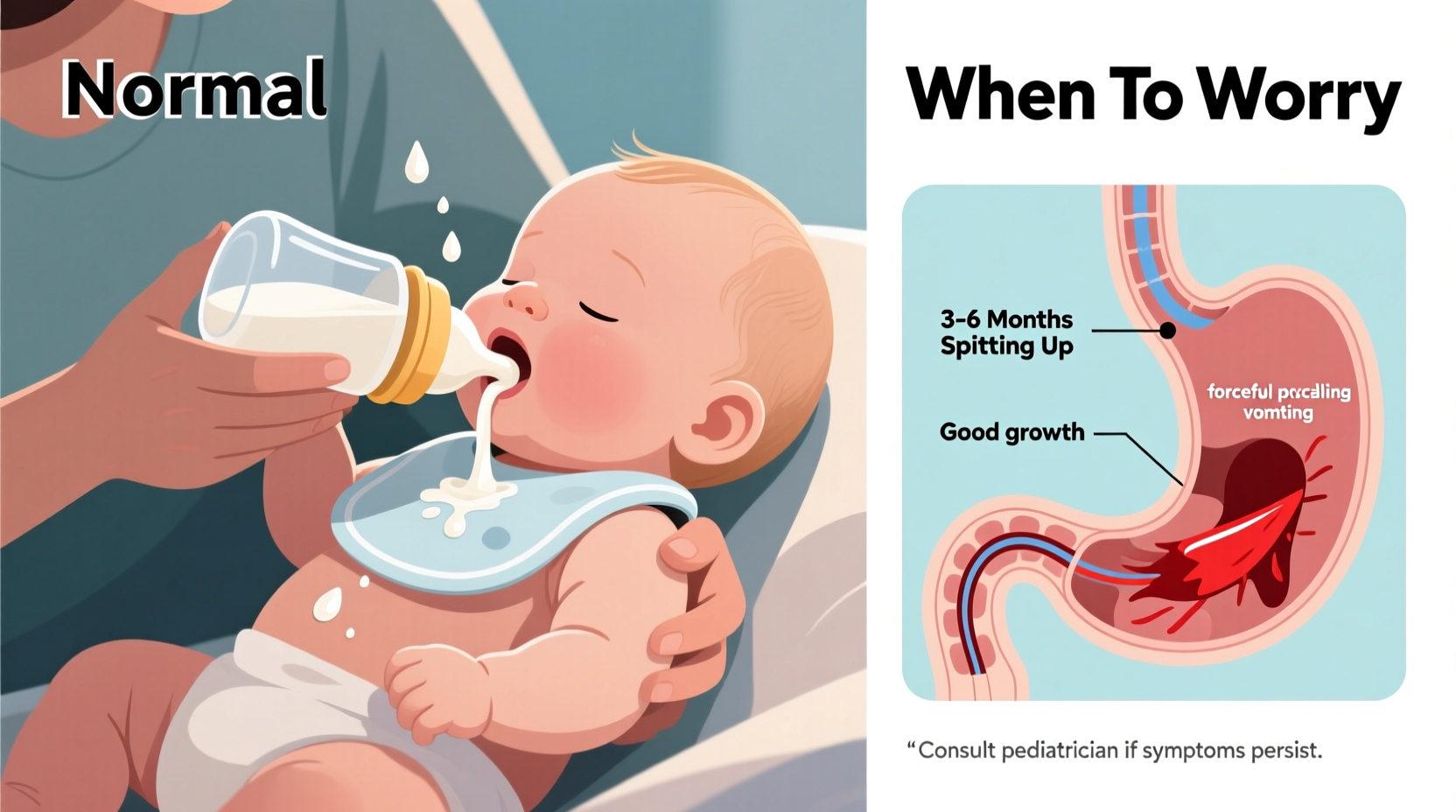Spitting up is a common occurrence in infants, often leaving new parents anxious and uncertain. While it’s usually harmless and part of typical digestive development, knowing the difference between normal spitting up and signs of a more serious issue is essential. This guide breaks down the science behind why babies spit up, identifies what’s considered within the normal range, and outlines clear warning signs that warrant medical attention.
Why Do Babies Spit Up?

Infants frequently spit up because their digestive systems are still maturing. The lower esophageal sphincter (LES), a muscular valve between the esophagus and stomach, is often underdeveloped in newborns. When this valve doesn’t close properly after feeding, stomach contents can flow back into the esophagus and out through the mouth — a process known as gastroesophageal reflux (GER).
Babies also have small stomachs and consume large volumes of liquid relative to their size, especially during growth spurts. Overfeeding or swallowing air during feeding can increase pressure in the stomach, making reflux more likely. In most cases, this resolves naturally by 12 to 18 months as the digestive tract matures.
What’s Considered Normal Spitting Up?
Normal spitting up typically occurs shortly after feeding, involves small amounts (a tablespoon or less), and doesn’t cause discomfort. The baby remains happy, gains weight appropriately, and shows no signs of pain or breathing difficulties. Most infants who spit up fall into this category and require no treatment beyond routine care adjustments.
Key characteristics of normal spitting up include:
- Occurs during or right after feeding
- Does not project forcefully (distinguish from vomiting)
- Baby continues to eat well and gain weight
- No associated crying, arching, or distress
- Frequency decreases around 6–7 months
“Most infants spit up occasionally, and it’s rarely a sign of illness. As long as the baby is thriving, there’s usually no cause for concern.” — Dr. Laura Chen, Pediatric Gastroenterologist
When to Worry: Red Flags That Require Medical Attention
While spitting up is typically benign, certain symptoms may indicate gastroesophageal reflux disease (GERD) or other underlying conditions. Parents should consult a pediatrician if any of the following occur:
| Symptom | Potential Concern | Action Step |
|---|---|---|
| Frequent projectile vomiting | Pyloric stenosis (narrowing of stomach outlet) | Seek immediate evaluation |
| Poor weight gain or weight loss | Nutritional deficiency or chronic reflux | Schedule pediatric visit |
| Green or yellow bile in spit-up | Intestinal blockage | Urgent medical assessment needed |
| Refusal to feed or crying during feeds | Painful reflux or allergy | Discuss with doctor |
| Chronic coughing or wheezing | Aspiration of stomach contents | Requires diagnostic review |
Case Example: Recognizing GERD Early
Six-week-old Mia began spitting up frequently after every feed. At first, her parents assumed it was normal. But over time, she started arching her back during meals, crying inconsolably after eating, and failing to gain weight. Her pediatrician diagnosed mild GERD and recommended smaller, more frequent feeds along with upright positioning after meals. Within two weeks, Mia’s comfort improved significantly, and she resumed healthy weight gain. Early recognition prevented complications.
Practical Steps to Reduce Spitting Up
While you can't eliminate spitting up entirely in many infants, several evidence-based strategies can reduce its frequency and volume:
- Feed in an upright position: Hold your baby at a 30–45 degree angle during feeding to use gravity to keep milk down.
- Burp frequently: Stop halfway through bottle feeding or when switching breasts to burp your baby.
- Avoid overfeeding: Stick to age-appropriate portion sizes. Newborns may only need 2–3 ounces per feed.
- Keep baby upright after feeding: Hold your infant in an upright position for 20–30 minutes post-feed.
- Check bottle nipple size: A too-fast flow can cause gulping and excess air intake.
- Elevate the crib slightly: Place a firm wedge under the mattress (not inside the crib) to prevent nighttime reflux.
Could It Be a Milk Protein Allergy?
In some cases, spitting up may be linked to cow’s milk protein allergy (CMPA), especially in formula-fed infants or those exposed via breast milk. CMPA affects about 2–3% of infants and can cause both gastrointestinal and skin symptoms.
Signs that suggest a possible allergy include:
- Bloody stools
- Eczema or rashes
- Chronic diarrhea
- Excessive fussiness unrelated to feeding
If CMPA is suspected, a pediatrician may recommend a trial elimination diet for breastfeeding mothers or switching to a hypoallergenic formula. Never make dietary changes without professional guidance.
Frequently Asked Questions
Is spitting up the same as vomiting?
No. Spitting up is a gentle flow of stomach contents, often without effort. Vomiting is forceful, projectile, and accompanied by abdominal contractions. Occasional spitting up is normal; frequent vomiting is not.
How long will my baby spit up?
Most babies stop spitting up regularly by 7–8 months, with the majority outgrowing it by 12 months. Upright mobility and improved digestive control contribute to the decline.
Should I change my baby’s formula if they spit up?
Not automatically. Spitting up alone isn’t a reason to switch formulas. However, if your baby shows other signs like poor growth, blood in stool, or severe discomfort, talk to your doctor before changing anything.
Final Thoughts: Trust Your Instincts
Understanding the mechanics and patterns of infant spitting up empowers parents to respond calmly and effectively. Most cases are a normal part of development and resolve without intervention. Simple feeding adjustments often make a meaningful difference.
However, medicine recognizes that parental intuition is a powerful diagnostic tool. If something feels off — even if your baby is gaining weight — don’t hesitate to seek a second opinion. Conditions like GERD, pyloric stenosis, or allergies are manageable when caught early.









 浙公网安备
33010002000092号
浙公网安备
33010002000092号 浙B2-20120091-4
浙B2-20120091-4
Comments
No comments yet. Why don't you start the discussion?